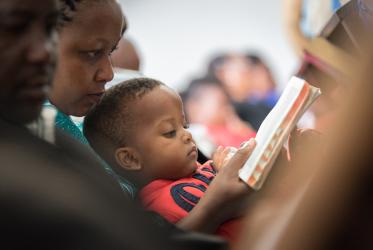By Ivars Kupcis*
Behind Bali’s luxury hotels, sandy beaches and lush landscapes pampering tourists from all around the world, one finds a heartbreaking poverty, and its most vulnerable victims are children.
Founded by the Protestant Christian Church in Bali, the Widhya Asih Foundation runs seven orphanages in Bali, Indonesia, and is one of the leading social service agencies working to reduce poverty among the island’s inhabitants.
“Our focus is to help orphans as the most impoverished people among us”, says Rev. I Made Budiarsa, director of the Widhya Asih Badung Orphanage. Providing a safe living space, nourishing food, health care and access to education, as well as training in various practical life skills, the orphanage “helps children to help themselves to break their cycle of poverty”.
The orphanage in the Badung region has become a safe space for children aged 12-18 from extremely poor families who may also be victims of violence, exploitation or natural disasters, and is accordingly extending its services to vulnerable children beyond those who have lost their parents.
Children living in the orphanage belong to six different religions, therefore respect of each other and mutual understanding are key principles learned. “We cannot force a view of particular religion, but we can reflect and implement the love of Christ in our work”, says Budiarsa, adding that children pray together before meals.
Widhya Asih Orphanage building in Badung region of Bali, Indonesia. Photo: Ivars Kupcis/WCC
“Our struggle should be to provide every child in the world with opportunities any child in the world would have according to what God has planned”, said Rev. Frank Chikane, moderator of World Council of Churches (WCC) Commission of the Churches on International Affairs during a visit to the orphanage. “The day we can say we have succeeded will be the day when every child will have the same opportunities”.
Scholarships for many of the children are provided annually by selling crafts and accessories created with the help of the Women’s Fellowship of the Protestant Church in Bali. Crafts include necklaces, earrings and various other accessories and decorations made from plastic waste.
According to Verasea Manurung, secretary of the Women’s Fellowship, one of the group’s major projects is a “Clean & Green” programme, promoting and teaching the sorting of waste to local communities.
Another initiative of the Women’s Fellowship focusing on the environment and sustainability is planting of trees. Within the program, around 500 trees are planted annually, including the trees planted around the churches in Bali.
*Ivars Kupcis is communication officer for the World Council of Churches
Racism, climate change and economic justice in the spotlight of WCC international affairs meeting in Indonesia (WCC press release 27 February 2019)
Papua human rights situation, religious freedom, focuses of WCC delegation visit to Indonesia (WCC press release 25 February 2019)
Photos from the WCC's CCIA visit to the Widhya Asih Foundation







